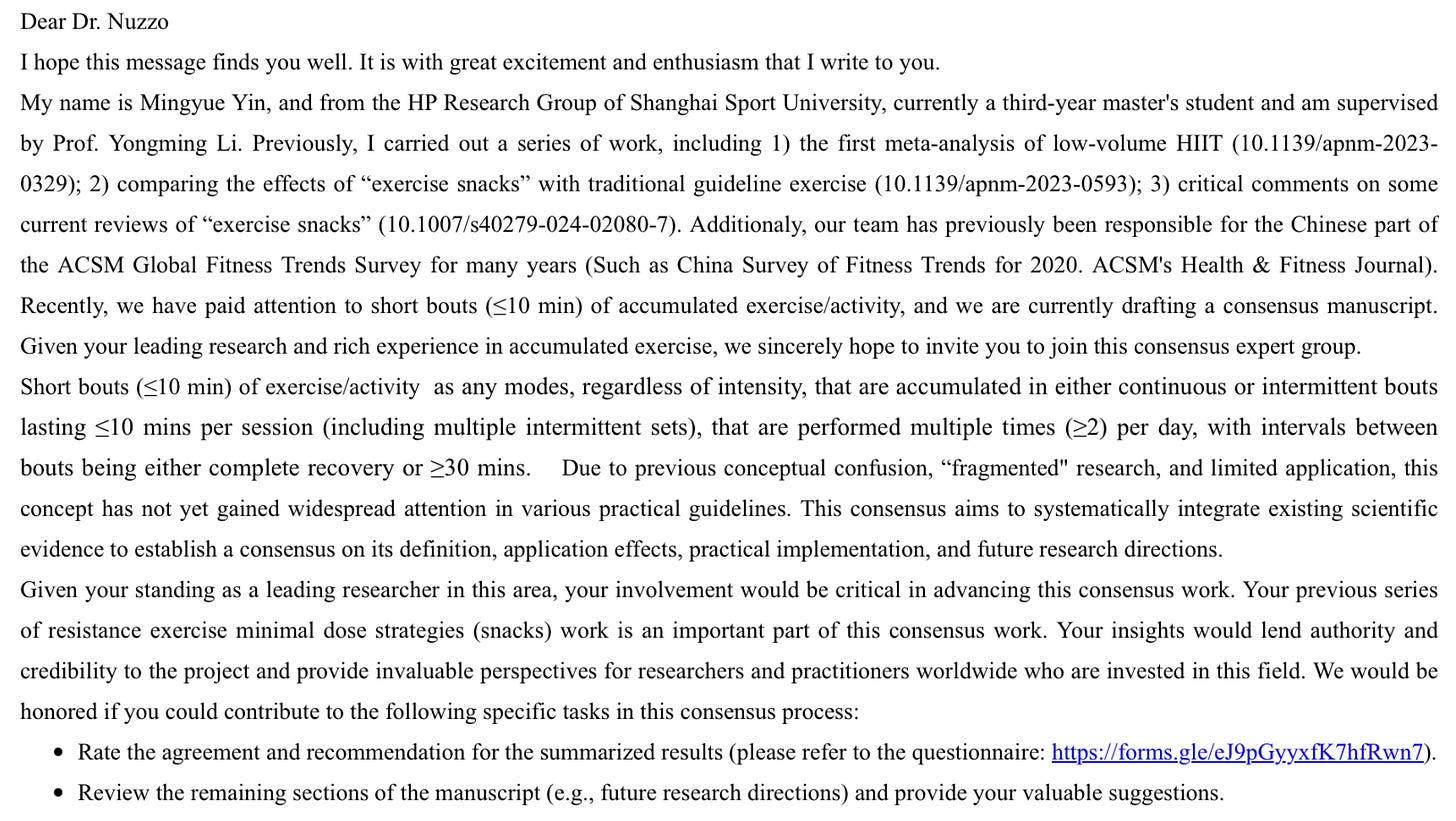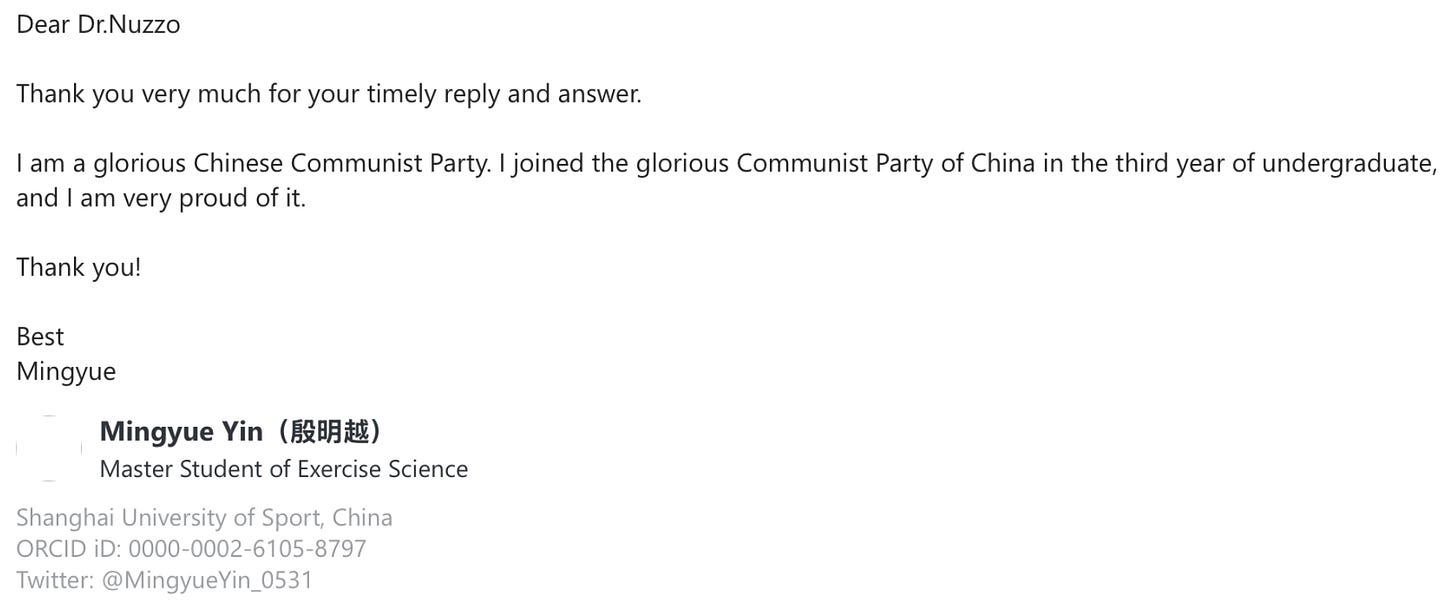
On October 13, I received an email from a master’s student of exercise science at the Shanghai University of Sport in China. The student’s name was Mingyue Yin.
Mr. Yin invited me to co-author a consensus paper about minimal dose exercise training. Minimal dose exercise training, which I have discussed previously at The Nuzzo Letter, is an amount of exercise that does not meet recommended exercise guidelines but that still has the potential to improve health and function. I was likely asked be a part of the consensus paper because of a review that colleagues and I published on minimal dose resistance exercise earlier this year.
I was not the only other researcher invited by Mr. Yin to co-author the consensus paper. The email was sent out to approximately 40 researchers. A couple of the names on the list were familiar to me. They were exercise researchers in Australia and the United States. However, most of the names, particularly the Asian and presumably Chinese names, were unfamiliar to me.
Mr. Yin’s invitation was collegial. His email provided clear instructions on what would be expected from invited authors to allow them to be co-authors on the paper. Mr. Yin’s email included attachments of the completed paper and a graphical abstract for the paper. The paper, including all tables, figures, and references, was 158 pages. Clearly, Mr. Yin had already done all the heavy lifting. He was merely asking invited authors to provide ratings of agreement with the summarised results and to review the paper more broadly.
In the minds of most researchers, irrespective of their academic rank, saying yes to Mr. Yin’s invitation is a no-brainer. Being an author on a consensus paper has many benefits. First, to be asked to part of a consensus paper is itself an achievement. It means that the invited author is being asked, based on their expertise, to help set the foundation for future thinking and practice related to the paper’s topic – in this case, minimal dose exercise training.
Second, being part of a large consensus with many international authors shows that the invited author has the potential or capacity for international collaboration – something that is highly valued by grant giving agencies and university employment committees.
Third, the consensus paper will be published in a leading journal. As Mr. Yin also stated in his email, he intends to submit the paper to Sports Medicine or the British Journal of Sports Medicine – two of the highest ranked journals in exercise and sports science. Publishing the paper in one of these leading journals will result in media attention and will also look good on the invited author’s CV and grant applications.
Fourth, because the paper is a consensus statement that will be published in a high-ranking journal, this means that the paper will be cited frequently. Frequent citation will then increase the invited author’s h-index, and the h-index is often included in job and grant applications.
Finally, the amount work and time that is required from the invited author, particularly in light of all the benefits just mentioned, is minimal. In fact, the tasks requested of co-authors by Mr. Yin can probably be completed within one day.
So, I accepted Mr. Yin’s invitation, right?
Having A Moral Compass
China, where Mr. Yin and his colleagues reside, is governed by the Chinese Communist Party (CCP). Communism is a sociopolitical system that rejects individual liberty, including freedom of speech and assembly. In addition to its lack of recognition of basic human rights, such as in Hong Kong, the Chinese government has been accused of stealing intellectual property from other countries for many years, and it has not been transparent about the origins of COVID-19.
As an advocate for individual liberty, I do not want to be associated with communism, the CCP, or its members, nor do I want the Chinese government to benefit from use of my name or expertise or to try to win influence over me or my employer in some way. Consequently, my willingness to accept the invitation that Mr. Yin extended to me hinged upon his research team’s affiliation with the CCP. As you will see in the screenshots provided, I responded to Mr. Yin’s invitation by asking him if he or his labmates were members of the CCP.
Initially, Mr. Yin tried to avoid my question, or perhaps he did not fully understand it. He asked if his answer would impact my willingness to be part of the paper. I told him, yes, though I did not tell him in what direction my decision would go. I asked Mr. Yin a second time if he was a member of the CCP.
In broken English, Yin eventually replied: “I am a glorious Chinese Communist Party. I joined the glorious Communist Party of China in the third year of undergraduate, and I am very proud of it. Thank you!”
Decision Background
I rejected Mr. Yin’s invitation because he is a communist, and I do not want to collaborate on research with communists. My decision was also influenced by observations that I have made of China in the academic publishing space, including China’s unclear relationship with the Journal of Sport and Health Science and with MDPI journals. My decision was also influenced by a recent conversation that I had with a Taiwanese researcher about China and also by Salvatore Babones’ chapter on China’s influence in Australian higher education in his book, “Australia’s Universities: Can They Reform?”
Let us start with Babones.
China’s Influence at Australian Universities
Salvatore Babones is an American. He is an Associate Professor of Sociology who lives in Australia and works at the University of Sydney. In 2021, Babones wrote a book titled, “Australia’s Universities: Can They Reform?” The book, which I highly recommend, is a critique of Australian higher education and how it can be reformed to better serve the Australian public interest.
One of the chapters in Babones’ book is titled, “Have Australia’s universities been corrupted by China?” In the chapter, Babones argues that Australia’s interests and values are at-risk by the current relationship between Aussie universities and China. Babones says that the relationships themselves do not imply “misbehavior on the part of the scientists involved” or “malpractice on the part of their universities.” Instead, Babones believes that the current relations between Chinese and Australian researchers create “structural risks” for Australian universities and thus the broader Australian community. More specifically, Babones argues that these relationships generate “strong incentives for Australian universities to acquiesce in Chinese practices and comply with Chinese demands.” Babones continues, “The real risk isn’t that China will steal Australian science. It’s that Australian universities will compromise their values in order to retain access to Chinese science.”
In his interview with John Anderson, Babones also explained that he believes that Australian universities will continue to police themselves as to not upset China. What might this mean in practical terms? Perhaps it means a university will be less likely to hire a professor who is critical of China or perhaps it will mean that a university will be quick to squash any campus activities that are critical of China.
Babones’ argument is intriguing and compelling. In recent years, I have also made observations that have caused me to be sceptical toward China in academia, particularly in the space of academic publishing. One of these observations involves the Journal of Sport and Health Science.
Journal of Sport and Health Science
The Journal of Sport and Health Science is becoming a prominent journal in the field of exercise and sports science. It was founded in 2012, and it is published by Elsevier – a major publisher of academic articles.
I discovered the Journal of Sport and Health Science several years ago when looking for a home for one of my research articles. At that time, I noticed something unusual about the journal. On its website, the journal stated that all its papers are published open access, but that authors do not have to pay an associated article processing fee. Normally, if an author wants to make their article free to the public, and retain the copyright to the article, the author (or the author’s institution) has to pay the publisher between $2,000 - $5,000 USD.
I wondered – who was footing the bill to Elsevier? Who was making it possible for authors to have their articles published at the Journal of Sport and Health Science without charge?
Then, I noticed on the journal’s website that Shanghai University of Sport – the university where Mr. Yin is based – is listed as the entity responsible for the journal’s peer review process. Apparently, Elsevier is responsible for producing and hosting the journal on behalf of the university.
Thus, it seems that the Chinese government is paying Elsevier to cover all open access costs at the journal. But why? And what are the implications of this?
Another odd aspect of the Journal of Sport and Health Science, which is likely tied to the fact that its papers are published open access by a major publisher at no cost to the author, is its rapid ascension in the journal rankings over its brief 10-year history. Currently, the journal boasts an impressive 9.7 impact factor. It is the third highest ranked journal in Physical Therapy and Sports Therapy and the fourth highest ranked journal in Orthopedics and Sports Medicine.
The journal’s editorial board is another point of interest. It is made up of Chinese researchers and prominent researchers from North America, including editor-in-chief Walter Herzog. Moreover, one of the journal’s Deputy Editors is Barbara Ainsworth. Followers of The Nuzzo Letter might remember Ainsworth, who I have discussed previously. Ainsworth was a co-author on a paper that made a false claim about women not being participants in early exercise research – a claim that I later corrected. Ainsworth was also a co-author on the American College of Sports Medicine’s DEI consensus paper that called for “equity in physical activity” – a paper that I also challenged publicly. Thus, it would not be surprising if Ainsworth was partaking in journal-related activities that might not be of the highest ethical or scientific standards.1
My scepticisms about the Journal of Sport and Health Science were confirmed by a Taiwanese exercise scientist who I recently shared stories with. The Taiwanese researcher, who I will call Kevin, told me that the Chinese government’s goal is to dominate the world in each area of life, including in sports and academic research. Thus, according to Kevin, the Chinese government has invested in the Journal of Sport and Health Science, and the journal operates under the direction of the Chinese government and must follow what the Chinese government wants it to do.
One example that Kevin gave me of this government control is that researchers who work at universities in Taiwan and publish in the journal are not permitted to put their Taiwanese affiliation in the author byline. For Taiwanese researchers, the journal prints that the researchers’ universities are located in China not Taiwan. This can be seen in the screenshots provided. The first screenshot is of a title page of an article published in the Journal of Sport and Health Science. Two of the authors of the article, Philip Fuchs and Tzyy-Yuang Shiang, work at the National Taiwan Normal University. This university is located Taipei – a city located in Taiwan. However, as can be seen in the author byline, the journal lists Taipei as being located in China. The decision to list China rather than Taiwan in the author byline is coming from the journal (i.e., the Chinese government). We know this because when the same authors publish their research in other journals, such as the journal Sensors, we can see that Taiwan is listed in the byline.
I also asked Kevin about the situation regarding the editors at the Journal of Sport and Health Science. Kevin told me one of his friends was a member of the journal’s editorial board several years ago. Kevin was informed that the Chinese government recruits well-established scholars in the West to serve as the journal’s editors. Kevin said that the Chinese government flies the editors over to China for meetings, with flights and hotels paid for by the Chinese government.
So, what does all this mean for the Journal of Sport and Health Science and what it publishes? It suggests that the journal is unlikely to publish results that show China or its policies in a negative light. For example, if a researcher were to submit an article to the journal with evidence that Chinese athletes were cheating to win matches, or that Chinese health policies were ineffective or immoral, I doubt that we would see such information published at the journal. And the decision to not publish such materials would be made, in part or in full, by the “useful idiot” western editors who the Chinese government has wined and dined.
MDPI Journals
China also appears to be playing a role in the proliferation of MDPI journals, though the exact nature of the relationship is unclear. Putting aside the ugly designs of MDPI journals, MDPI has been a controversial publisher of academic articles for many years. Some academics have claimed that MDPI is a “predatory publisher.” Questions have been raised about the quality of MDPI’s peer review process, while simultaneously authors are charged publication fees of $1,000-$3,000 USD. MDPI has fired back against claims that it engages in predatory practices. Yet, the publisher always seems to find itself garnering negative attention. For example, more recently, the popular MDPI journal, International Journal of Environmental Research and Public Health, was delisted from the Web of Science database for failing to meet academic publishing standards.
The headquarters for MDPI is in Switzerland. However, most of MDPI’s surrogate offices are in China, and I have been on the receiving end of relentless numbers of spam emails from MDPI journals in which the sender has a Chinese name.
Nevertheless, the relationship between the Chinese government and MDPI is unclear. For example, though China is home to many MDPI offices that encourage submissions to MDPI journals, the Chinese Academy of Sciences has flagged some MDPI journals as being problematic. Moreover, by way of a Chinese student, my Taiwanese colleague, Kevin, informed me that China generally does not recognize papers published in MDPI journals.
Thus, perhaps China is encouraging its scientists to publish in the highest ranked English journals, while facilitating westerns’ publishing in MDPI journals of questionable quality. Given that MDPI has several offices in China, the Chinese government and people might also profit from westerns lowering their standards and paying thousands of dollars to publish in questionable MDPI journals.
Conclusion
The moral compass of the West – the one I regularly look to for direction – points in the direction of human freedom and flourishment. It points in a direction opposite to that displayed on the compass held by Mr. Yin and his comrade colleagues.
American founding father, Thomas Paine, once said, “Those who expect to reap the blessings of freedom, must, like men, undergo the fatigues of supporting it.”
In other words, supporting freedom comes at a cost. Sometimes, it can cost someone their life; others time, it can cost them a job promotion or other form of career advancement. But one thing that supporting freedom will never cost someone is their conscience – the one thing that communists are so desperate to get a hold of and control.
Mr. Yin and his colleagues should know that I am rejecting their invitation because our values do not align. Our compasses point in opposite directions. My hope is that one day, while Mr. Yin is performing one of his recommended minimal dose exercising routines at the gym, it occurs to him that his compass is pointed in the wrong direction.
The western world is not perfect. But at least it is free.
Related Content at The Nuzzo Letter
SUPPORT THE NUZZO LETTER
If you appreciated this content, please consider supporting The Nuzzo Letter with a one-time or recurring donation. Your support is greatly appreciated. It helps me to continue to work on independent research projects and fight for my evidence-based discourse. To donate, click the DonorBox logo. In two simple steps, you can donate using ApplePay, PayPal, or another service. Thank you.
Barbara Ainsworth was also one of the researchers who Mr. Yin invited to be a co-author on the consensus paper. This can be seen at the bottom of Mr. Yin’s first email, where he lists the names of the researchers who have been invited to be part of the consensus.
























